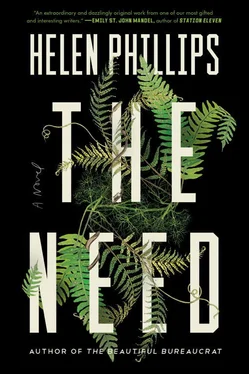But today Molly was thankful for the basement’s penetrability. She listened: their footsteps, their voices, the rhythms of their interactions. She understood, or believed she understood, everything: now someone was hurrying to the bathroom (Viv), now someone (Moll) was offering someone something, now someone (Ben) thumped hard against something and began to scream, now someone (Moll) rushed to him, now someone (Moll, carrying Ben) walked to the children’s room (to nurse), now someone (Viv) called for help (couldn’t reach the toilet paper).
And so. An average Sunday morning. Buffeted between their needs.
But after a while she came to wish the basement were soundproof. It was too much, the tenor of Moll’s voice, the way it successfully placated them. The mutual, palpable bliss of mother and children.
The infinite patience of the mother who was incapable of taking them for granted.
Pained, Molly pulled a pair of David’s headphones over her ears to block it all.
She felt uneasy without her phone.
There were plenty of books in the basement, books she wanted to read but never had time to; she often told David that her fantasy was to go to a cabin by herself for a week and read novels for six hours a day. But when she opened one such book and began to read, she felt almost illiterate: she read the same sentence over and over again until the words collapsed into letters and the letters collapsed into lines and circles.
She tried to remember what the kids had been wearing that Friday two weeks ago when Erika brought them to meet her after work. Perhaps Viv had been wearing the jean dress and Ben the yellow sweatshirt. She could picture them in those clothes, heading into the Phillips 66 with Erika. But she didn’t know for sure. What she did know was that the jean dress was at this moment hanging in the children’s closet, that the yellow sweatshirt (blueberry-stained) was dangling over the side of the laundry hamper.
She yanked off the headphones.
Upstairs, the energy was moving toward the front door, the jitter of feet near the hall closet. Then, the front door opened. Molly shut the book and stepped over the accusatory pile of laundry beside the washing machine in order to reach the end of the basement directly beneath the hall closet.
The front door closed. The house was silent. They were gone; they had gone out.
She was livid. Moll had taken them out without asking her.
Though she well knew that by 9:00 a.m. on a Sunday, some kind of outing was essential.
She should follow them. She would follow them.
She could not be asked to bear this unbearable situation.
She leaned against the cold concrete wall of the basement. Tired. So tired. She had not slept well last night, not on her makeshift bed of blankets in the hallway outside the children’s room, not with Moll down here glowing or glowering in her basement.
That viciousness in Moll’s eyes. The threat of the word Go .
Molly stepped away from the wall, dizzy with the double speeds of Earth, one thousand miles per hour, sixty-seven thousand miles per hour. She wilted onto the futon and realized it would be a very long time before she would have the wherewithal to stand up again.
From this position, with the right side of her face heavy on the mattress, she had a close-up view of the plastic chair with metal legs where David often sat to play.
She considered her reflection in metal legs, her stretched-out alien face. The light from the lamp appeared in the metal legs as four dashes of brilliance; she was outlandish amid the brilliance.
Later, she woke to witness the plastic chair: expectant. Nothing can look as empty as a piece of furniture intended to house the human body.
She remembered, for the first time in a long time, an old fear of hers from when Viv was newborn: that she would go into the baby’s room in the morning after letting her cry herself back to sleep in the night only to find an empty crib with a scribble of blood on the sheet, identical to the scribble of blood where a mouse thrashed its way out of the trap on the concrete floor of the basement of her childhood home.
She reached to turn off the lamp. In the dark, a woman walked past the futon. And then another. And another. And another. One after the other after the other after the other after the other.
When she again woke, there was once more the jitter of feet near the hall closet, the front door opening, as though no time had passed; as though she had, for hours now, remained stuck in the same instant.
But when she located the alarm clock in the mess of David’s stuff beneath the futon and the flashing red numerals yielded the time (3:37), she understood that Ben had recently woken from his nap, that they were now headed out for the requisite second outing of Sunday.
The front door slammed; she pictured Viv pulling it shut with all her might.
She ran up the basement stairs, pressed through the metal doors (not padlocked from the outside), emerged unsteady into the luminous afternoon. She tried opening the back door. It was negligent of Moll to have forgotten to lock it, but she was glad to save the seconds it would have taken her to use the key.
She slipped into her home (just as messy as it would have been under her watch at this hour on a Sunday; dishes on the table, toys everywhere). In the bedroom she opened her closet. She didn’t have time to change out of the sweatpants and T-shirt into more reasonable clothing. She shoved her feet into sneakers and ran out the front door.
They were not visible from the front steps. They had made good time, already turning left or right at the sidewalk and then left or right at the corner. Sometimes it took ten minutes just to get from the front steps to the stop sign. She guessed that they had turned left and left again, on their way to the playground and the old carousel, which was open only on Sundays. At least, that’s what she would have done with them today, which either did or did not mean that Moll would do the same. She ran. Left, and left again.
There they were. Their three bodies of such different sizes, moving slowly down the sidewalk together. So this was what she and her children looked like from behind.
Perhaps they had made good time for the first block and a half, but no longer. Viv wanted to push the stroller rather than ride in it; she kept steering it off the sidewalk, veering onto people’s front yards. Ben was walking, dawdling, gripping Moll’s finger. Molly never would have permitted him to walk at this juncture; far too far to go. She knew he must have squirmed so much in the baby carrier that Moll, tenderer than she, had released him from his entrapment.
Molly considered the other baby carrier, the matching carrier in Moll’s world. The same tan color, the same watermelon stain.
The thought caused her to hang back like a guest at a funeral. She kept a safe distance, moving from tree to tree, relieved at the abandoned quality of these particular blocks on Sunday afternoon.
“Is that cat dead?” she was close enough to hear Viv say when they passed the veterinarian’s office.
“No,” Moll said, lifting a surprisingly compliant Ben and inserting him into the carrier with practiced grace.
“Excuse me,” Viv said to the fire hydrant into which she rammed the stroller.
Instants later, Molly too passed the window where the calico cat slept a deathlike sleep on the desk.
“Seven,” Moll and Viv shouted together. “Eight. Nine. Ten. Eleven. Twelve.”
At each odd number, Moll pushed Viv’s swing with her right hand. At each even number, she pushed Ben’s swing with her left hand. This method Molly had developed for pushing both at once had always felt to her like a literalization of the phrase she’s got her hands full .
Читать дальше





![Unknown - [Carly Phillips] The Bachelor (The Chandler Brothe(Bookos.org) (1)](/books/174132/unknown-carly-phillips-the-bachelor-the-chandle-thumb.webp)






